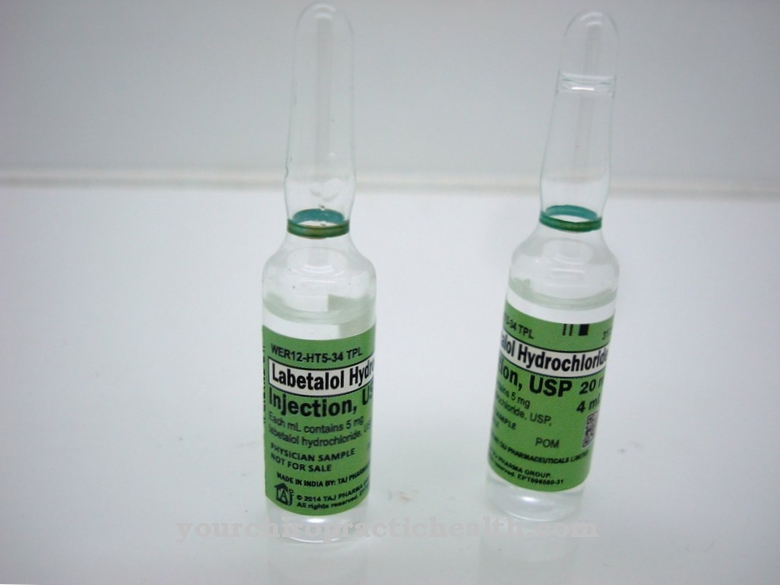With the active ingredient Thiopental it is a hypnotic, i.e. a sleeping aid that is only effective for a very short time. It is also called Trapanal or Pentothal designated. The substance thiopental is a sodium salt and belongs to the group of barbiturates, which have no analgesic effect. The active ingredient was developed by Volwiler and Tabern in the early 1930s. The customer was Abbott Laboratories.
What is thiopental?

The active ingredient thiopental is mainly used in the context of anesthesia to induce anesthesia. The focus is on the use in uncomplicated patients, i.e. people without problems with the heart or lungs.
In addition, the active ingredient thiopental is also used in intensive care medicine, where it is used as a continuous infusion in individual cases. However, it is considered the last resort to lower intracranial pressure and end the status epilepticus.
Basically, thiopental is an active ingredient from the category of thiobarbiturates. The substance is characterized primarily by its sleep-promoting, dampening and narcotic effects. The onset of the effect occurs very quickly and only lasts for a short time.
For this reason, the active ingredient is also used in anesthesia. The preparation is usually injected intravenously. An overdose must be avoided in any case, as it can sometimes be fatal.
In certain states, the substance thiopental is used in executions. It is also used in some places as a so-called truth serum and for euthanasia. However, the drug is not intended for these purposes and is not approved in Germany.
In the USA in particular, the agent is used to prepare people for execution by lethal injection. In Ohio, the active ingredient thiopental was used for an execution for the first time in 2009. For this reason, German pharmaceutical companies are no longer sending deliveries of thiopental to the USA in order to rule out improper use in the context of executions. Since 2011, thiopental can no longer be exported from the EU without a special permit.
Pharmacological effect
The drug thiopental has a beneficial effect on sleep and has narcotic properties. The effect is set quickly and usually within about 30 seconds. After a single dose, the effect of thiopental usually lasts for about half an hour before gradually wears off.
Basically, the active ingredient thiopental has a dampening effect on the circulatory, heart and respiratory functions. The injection should never be carried out too quickly.
The effects of the drug result from the fact that the effect of the neurotransmitter GABA is increased. Because due to its agonistic effect on a special part of the GABA receptor, the active ingredient thiopental causes more chloride ions to enter. As a result, the nerve cells are hyperpolarized. If thiopental is taken in higher doses, the active ingredient blocks certain processes in the central nervous system.
When the drug thiopental is administered intravenously, a large part of it binds to plasma proteins. Then it is distributed in the organism primarily to those organs that have a strong blood supply. It later reaches the central nervous system and finally the muscle and fat tissue. After all, it is evenly distributed between the muscles and the blood plasma.
In overweight patients, the dose of thiopental should never be increased. Because the active ingredient accumulates in the fatty tissue and can cause an accumulation.
The half-life of thiopental is between five and six hours. In the organism the substance is metabolized to pentobarbital. Most of the active ingredient is broken down in the liver.
Medical application & use
The drug thiopental is primarily used in the context of anesthesia. Due to the rapid onset of hypnotic effects, the drug is mainly used to induce anesthesia. In uncomplicated patients in particular, the active ingredient thiopental is a popular replacement for the substance propofol.
In addition to the medical application of the drug, other areas of application extend, for example, to use in toxic syringes and truth sera. Thiopental is used in intensive care medicine to lower intracranial pressure.
You can find your medication here
➔ Medication for sleep disordersRisks & side effects
Various undesirable side effects are possible during therapy with the drug thiopental. For example, respiratory depression can occur, which in the worst case leads to respiratory failure. The muscles in the respiratory tract also sometimes cramp during intake.
Sometimes more histamine is released and blood pressure drops sharply. In addition, a reflex acceleration of the pulse rate is possible, which irritates the veins and increases myocardial oxygen consumption.
In some cases, the injection causes damage to the tissue that can even result in necrosis. The affected patients suffer from enormous pain and there is a risk of limbs being lost.
Other possible side effects from the active ingredient thiopental are, for example, a euphoric mood, confusion, drowsiness as well as nausea and vomiting.
An overdose of thiopental is life-threatening as it can lead to death due to respiratory arrest or cardiovascular collapse.












.jpg)



.jpg)










.jpg)
